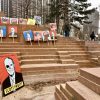Some say Coloradans need to start thinking outside of the doctors-office box if they want to maximize the healing potential of natural psychedelic medicines.
The goal should be to develop what clinical psychologist Adele Lafrance calls a “community-based model of healing,” or one where people can access brief mental health interventions in comfortable spaces that are nowhere near a hospital or mental health ward.

To that end, Lafrance and the Nowak Society, a nonprofit psychedelic advocacy group, are hosting a four-part series of workshops in Denver. The workshops are meant to give non-psychedelic professionals some skills and knowledge about the personal use of natural medicines. The first one was held on May 11, and the next three will be in June, August, and September.
“We really want to demystify some of the clinical and guide skills for psychedelic treatments,” Shannon Hughes, who sits on the Nowak Society’s board of directors, said during the workshop. “We want to create robust communities who can hold this work for themselves. This is all about harm reduction and optimizing the benefit of these medicines now that they’ve been decriminalized.”
One tenet of Lafrance’s model is that a patient’s loved ones or guardians should be taught some skills to perform psychedelic healing experience at home. Lafrance says this allows the treatment to meet the patient where they are both physically and conceptually.
“Not everyone feels comfortable at a psychologist’s office and for good reason,” Lafrance said.
While every treatment is different, Lafrance said there are a few principles that apply in most cases. The following tips should not be considered medical advice, but rather guidelines that show what it takes to successfully guide someone through a psychedelic healing experience.
Do your homework and ask questions ahead of time
Lafrance said one of the most important steps a psychedelic guide can make is to ask the patient to share a little bit about the challenges they want to overcome.
Even if a patient’s issues are well-known to their guide, asking what emotions may be particularly difficult to label or manage can help set the expectation for the session and prepare the guide for some of the experiences that may arise, Lafrance added.
A patient’s response can be classified as either Anger/Resentment or Anxiety/Sadness, Lafrance said. If it fits the Anger/Resentment category, Lafrance said the guide may encounter underlying feelings of grief, shame or fear. Patients who are part of the Anxiety/Sadness group are usually struggling with ways to healthily express anger, she added.
Studies have found that psychedelics can be a particularly impactful tool for people to learn new ways to process their emotions. For instance, a 2013 study from the University of South Carolina found that taking occasional low doses of “magic mushrooms” can help repair parts of the brain associated with emotional control.
A 2021 study from the University of California San Francisco found that regular doses of MDMA can help reverse the symptoms of post-traumatic stress disorder within 18 weeks of treatment.
“Psychedelics can really help unpack our emotional processing system, which is really like a ball of yarn,” Lafrance said. “All you need to do is start pulling at the strings.”
Go slow and support self-sufficiency
Patients turn to psychedelic medicines to overcome a wide variety of challenges such as poor emotional processing skills, self-criticism, or problems with personal relationships, Lafrance said. Each one of these cases comes with its particular challenges, she added.
While it can be exciting to help someone overcome a major emotional hurdle, Lafrance said good psychedelic guides are the ones who help patients achieve milestones slowly.
One reason why Lafrance advocates for slowly working through a patient’s challenges is that psychedelic experiences can be retraumatizing.
“You need to leave room for the patient to say ‘no this isn’t it’,” she said. “The guide is really there to help the patient be able to process their emotions on their own.”
This approach also requires a bit of finesse, according to Lafrance. For example, she suggests that psychedelic guides avoid characterizing emotional responses as good or bad. Instead, guides should help the patient understand why a particular emotion arose when it did. This can help a patient stop avoiding their emotions and start integrating them instead, she said.
Guides can suggest ways to handle the emotion in the future. But Lafrance admits this must also be done in a tentative way. Guides should validate the feelings that come up during a healing session and be prepared to “ride the wave” all the way to shore, Lafrance said.
Celebrate love and connectedness
It seems cliche to talk about feeling one with the universe during a recreational psychedelic experience, but Lafrance says it is an important feeling that can arise during a healing session.
Lafrance said some common conditions such as depression and PTSD are often associated with feelings of disconnectedness and isolation. Psychedelic treatments can help address these feelings by creating feelings of love and connectedness, even if only temporarily, Lafrance said.
One way to heighten this experience is to teach a patient breathing techniques. Doing so can help the patient learn to connect their body and mind on their own terms, Lafrance said.




